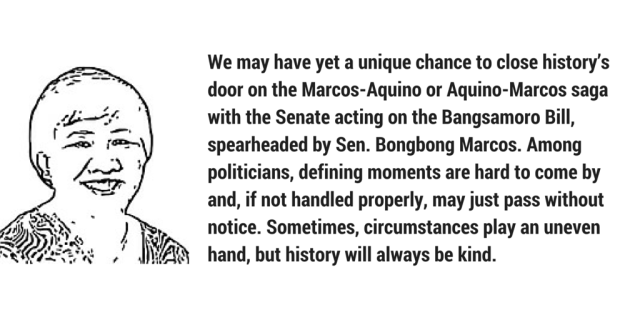Pro PolitiCS
- Details
- Blog Content
- Hits: 4885
First published in the author's column in The Manila Times

When politics is introduced into every equation, people would often say things will be muddled up so much it can never solve a problem. That is not true if one bears in mind Harold Lasswell’s definition of politics. “Who gets what, when and how” is essentially an allocation problem. Think about it. Budget is allocation. Identification of power and modes of sharing the same are all about allocation. Writing laws and implementing the same are all about allocation. What makes politics bad is the partisanship in its exercise.
On two instances, we accepted an invite from the Institute for Autonomy and Governance for a chance to dialogue with the people on the ground in Zamboanga City (for the island provinces of Basilan, Sulu and Tawi-Tawi of BASULTA) and Davao City (Lanao del Sur and Maguindanao). These events took place after the messy landing of the Bangsamoro Bill (BB) post Mamasapano. We accepted the invite for a chance to listen to the ground and hear personally what went wrong with the draft and how to move forward. We have taken opposition on certain provisions of the draft but hearing the ground is material in making value judgments.
The ARMM Law had a different route than BB. The ARMM bill was written and filed by legislators while the BB bill was purely an Executive branch product sans Congress– from the Framework Agreement on the Bangsamoro or FAB to the Comprehensive Agreement on the Bangsamoro or CAB and then the draft BBL. Surely, any solution in Muslim Mindanao has to bring into the picture two things: lessons from 26 years of ARMM and the involvement of Congress.
The strategy adopted purely relied on the soaring popularity of BSA3 that those in charge of the peace process forgot to plan an alternative scenario. That the public face used proved to be limiting was another tactical blunder. That no reframing done on communication post Mamasapano created much doubt in the process.
Without Mamasapano, Congress could have fast tracked the process and we would have by now a badly written Bangsamoro law. Without Mamasapano, we would not have been able to see who among our legislators are true leaders and who among them will play to the peanut gallery guided by surveys saying BB is not supported by the public. Without Mamasapano, we cannot wear a different lens to really ask ourselves, is this the right way to settle once and for all the century old neglect. Without Mamasapano, we won’t be able to have the unique chance of harmonizing (42 consensus points) the gains of ARMM fought for by the MNLF and the gains of MILF in this round, pushing for the inclusion of other groups to prevent the any splinter from asking another round. Without Mamasapano, we will not even exhaust the possibility of once and for all settling a hanging question of having a plebiscite in the 13 provinces of the Tripoli Agreement.
Yes, interests articulation and aggregation were made by MNLF in the case of the ARMM and Expanded ARMM laws and MILF on BB but surely people from Luzon is not hearing the people on the ground when the public face to the issues are officials from the Executive and the MILF. You have to hear the people on the ground cause only then will elected representatives can make hard decisions barring partisanships. But since the role of Congress was minimized from the beginning, trust and confidence are hard to come buy, most especially when officials from barangays to municipalities have not been consulted. That problem will create havoc in a plebiscite.
But good intentions can often lead to unintended consequences and we have to find a different path to directly respond to issues continually set aside, hoping for a better tomorrow where we can again settle old wounds. And this is where the Pro PolitiCS for Peace program comes into play. Spearheaded by four non-government organizations: IAG, Local Government Development Foundation (LOGODEF), Philippine Center for Islam and Democracy (PCID) and Zamboanga Basilan Integrated Development Alliance (ZABIDA).
Pro PolitiCS for Peace is a 3-year project that seeks “to help shape a stable environment in support of the Mindanao peace process. It engages political leaders in a dialogue, capacity building, researches and studies to enhance their informed and principled participation in the crafting and implementation of the roadmap and processes for sustainable peace and development in Mindanao.”
We may have yet a unique chance to close history’s door on the Marcos-Aquino or Aquino-Marcos saga with the Senate acting on the BB, spearheaded by Sen. Bongbong Marcos. Among politicians, defining moments are hard to come by and, if not handled properly, may just pass without notice. Sometimes, circumstances play an uneven hand, but history will always be kind.
The paths to peace are aplenty. Pro PolitiCS prepares the ground for the passage of the BB or for further delay. Surely, the peace agenda need to be carried across administrations. The program ensures that the ground is prepared better than when ARMM was passed. It will provide technical assistance, engage provincial peace and order councils, promote the role and participation of women, indigenous peoples and Muslim religious leaders.

